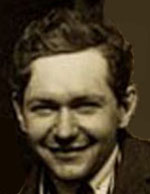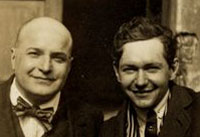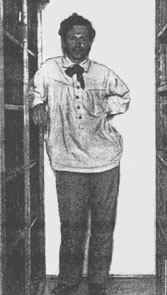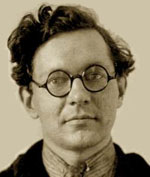Sinological Profiles
Iulian Shchutskii
23 Aug 1897 (Ekaterinburg) - 18 Feb 1938 (Leningrad)Shchutskii represents the abortive coming to maturity of a young Sinological tradition.
He was born into the family of a forester of respectable Polish origin, in Ekaterinburg in the Urals, far to the east of Moscow and, symbolically enough, a terminus of the Trans-Siberian Railway, looking further eastward. He did his secondary schooling at the Polytechnic Institute in Petrograd (which until 1914 had been St Petersburg), Peter the Great's intended "window on Europe." Shchutskii looked well out of the western window, and in his short life, he went far down the eastern road. His path was wider than the road allowed. Said his fellow student Poppe, who was another unwilling reader of Marx at that time, "He was an idealist, and believed in the soul and spirit of man."
His mother was a teacher of music, French, and German. Shchutskii himself had a strong aesthetic sense, and a remarkable aptitude for languages. In 1917, the year of the Revolution (which first broke out in Petrograd), he left the Polytechnic for the Practical Oriental Academy, and after a year transferred to the University at Petrograd, where he studied Chinese history and philosophy with Ivanov (who, some years earlier, had briefly taught Karlgren basic Chinese). He also studied Chinese language and literature with Alexeev at the Ethnology and Linguistics Section of the Chinese Studies Department (Faculty of Social Sciences). This beginning identified him with the classically oriented Petersburg tradition of Russian Sinology, in contrast to the Moscow tradition, which focused instead on contemporary China and the problems which the Chinese economy and the Chinese revolution raised for Marxist theory. There was also a strong interest in Buddhism in Petersburg circles. From this classical bastion, with its spiritual and thus potentially heretical tendencies, and with Alexeev as his principal teacher, Shchutskii graduated in 1921, and embarked, or rather continued, on several projects leading in the mystical and poetic direction.
Over the years, many of the venturesome spirits in Sinology have been based in museums rather than in the more prestigious, but in Russia, also more ideologically scrutinized, university ambience. The coming man in Russian Sinology at this period was Alexeev, who in 1918 had become both Professor at the University (where he continued teaching despite the closing of the Oriental Faculty the previous year) and Curator and Senior Researcher at the Oriental Museum. The Museum gave him a second base; a realia base. Additionally, in 1919, Alexeev had become associate editor, and chief of the Eastern division, of the newly founded Publishing House for World Literature. This provided a publishing outlet. At the Museum, the previous Sinological library was greatly expanded, catalogued, and systematically used in research, by a team of young persons whom Alexeev gradually gathered around him. Here was the nucleus of a major research effort. The Museum also mounted exhibitions and gave lectures; here was the direct contact with a wider public. All the ingredients were present. The result was something of a powerhouse, and in that powerhouse Shchutskii found his place in 1920, a year before his graduation, as Alexeev's protégé.
Shchutskii was given bibliographical responsibility for the Dauism and Alchemy portions of the Museum's new acquisitions. This led directly to his translation of the Bau Pudz, completed in 1922. He also did extensive translations from late Tang poetry, a field in which Alexeev had worked; some of the the translations were published under Alexeev's editorship in 1923. Shchutskii's Asian linguistic accomplishments also included Manchu. Shchutskii and Alexeev were among those who took on the special problem of the Chinese script as it presented itself in Russian context, and were involved with the question of romanizing Chinese. A special qualifying commission in 1924 made it possible for Shchutskii to become an Assistant Professor in 1924, teaching at the University and also, from that same year, in the Institute of Modern Oriental Languages, where he introduced Cantonese alongside Mandarin Chinese, and gave the first courses in Vietnamese.
1924 was the year of new names, when Petrograd became Leningrad, and Shchutskii's birthplace Ekaterinburg (named for the Empress Catherine) became Sverdlovsk, in honor of the Communist leader Y M Sverdlov. These tremors at first left Shchutskii undisturbed. He married in 1928, with Nicholas Poppe, his fellow student and a specialist in Mongolian, as his best man. In that same year, he was sent to Japan by the Academy of Sciences, to acquire books in Chinese and Japanese, and to make contact with Japanese Sinologists. He thus became the Japan expert in the circle working under Alexeev. Shchutskii held the Museum connection through its 1930 reorganization into the Institute of Oriental Studies, and for the rest of his life.
Schutskii's teaching and research both continued at high levels in the early 1930's. His short grammar of Vietnamese was published in 1933. He participated, with Alexeev and others, in the ad hoc committee on the romanization of Chinese. In 1935, he achieved the status of a Candidate in Linguistics (equivalent to the PhD), and a full professorship. In 1936 he began work as a Research Fellow at the Hermitage Museum, also in Leningrad, Peter the Great's old collection, and in prestige terms, the apex of the Russian museum world. In 1937 he acquired the degree of Doctor of Philology (equivalent to habilitation in the German university system) with a major study of the Book of Changes. The examination was conducted by two members of the Academy of Sciences: Shchutskii's teacher and mentor Alexeev, by then a full member, and his younger but academically more advanced friend, the Japanologist Nikolai Konrad.
Shchutskii had been led to the Yi by noticing that it was indispensable to the understanding of orthodox Sung Confucian thought, and also that it stood at the head of the Han classics. As he himself put it in the revised version of his thesis, "We undertook this work because in studying the materials on the history of Chinese philosophy we constantly found it necessary to preface the analysis of each philosophical school with a preliminary analysis of the Book of Changes - a fundamental starting point of discussion of almost all philosophers of ancient China." In addition, the Yi was in the air: A A Petrov's study of Wang Bi's Yi commentary, mentioned in Shchutskii's thesis, had been published in 1936.
The Yi was thus logical. It was timely. It was also dangerous stuff. It had been associated with the power theories of the middle Warring States, and in that period, it was intensively studied in the capitals of both Chi and Ngwei, bypassing the official virtue theories of the time, and linking mystical access with worldly power. The early Jesuit missionaries who took up the study of the Yi, as Hellmut Wilhelm noted in his Peking lectures in this same period, were eventually denounced by the Church as heretics. In Revolutionary Russia also, the always revolutionary Yi was a delicate topic. So were Dauism and Buddhism, in which Shchutskii was actively interested. Shchutskii's personality was also against him in these dark years: as Poppe recalls, he was outgoing and liked to tell jokes. Some of the jokes were harmless (making up humorous Manchu names for his friends), but some were political. His favorite one was about
a Russian who has a job sitting on top of a high pole, pointing a telescope at the horizon and looking for the revolution. An American, down below, offers him a job cleaning up the Great Depression. The Russian refuses, since he would be out of work after cleaning up the Depression, whereas his present post is a permanent one. "One must consider one's job security."
It was funny, but it was just such indiscretions among friends that were liable to get people in trouble with the touchy Russian government.
In addition to all this, if more were needed, Shchutskii with his belief in the "soul and spirit of man" had become interested in an officially forbidden doctrine, the anthroposophical philosophy of Rudolph Steiner. He was a member of the Order of the Templars, a banned organization which at this time had several hundred members. The officers of the Order would would sometimes meet in Shchutskii's apartment. This was to tempt Fate too far. The NKVD came for him one night in early 1937, taking away his books and papers but leaving his wife and their daughter, then only a few years old. His friend Nevskii was also arrested, together with his wife, and both were sent to the prison camps. The Nevskiis' daughter, aged two, after staying for days in the empty apartment, was taken in by Konrad, the younger friend of both Shchutskii and Nevskii, who raised her as his own daughter. Poppe, another of Shchutskii's friends, did not linger for the inevitable, but escaped through the forests to Finland.
There was no trial. Shchutskii, his friend Nevskii, and one other student, were taken to a prison camp. Shchutskii's end came on 18 February 1938. His skull was crushed by a chain. He was forty-one.
It has been suggested that Shchutskii was Jewish, and that this played a role in his arrest by the Soviets. Research shows that some Shchutskiis from Iulian's part of Russia were indeed Jewish. But David Knechtges, who was one of two people to interview Shchutskii's close friend Nicholas Poppe about the arrest, recalls nothing being said about a Jewish factor. Gerald Swanson, the other interviewer, agrees, as to both Shchutskii and his friend Nevskii, for whom no Jewish scenario exists, and adds that Poppe was clear that Shchutskii's chief problem, in addition to his Anthroposophy interests, was "his wholesale mockery of Stalin, which he made no effort to hide." Dmitry Yelesin adds, "His daughter and niece stressed that he was descended from honorable Polish families. So I think he had no Jewish roots, but I never asked them about this."
It was the compassionate but more adroit Konrad, who in 1960, not long after the end of the Stalin era, arranged for the interrupted publication of Shchutskii's thesis, the revised manuscript of which was still on file in the Academy of Sciences Publishing House.
Shchutskii's work on the Yi may or may not have penetrated to the inner truth of the Yi. But his attempt marked within Russian Sinology a new level of awareness of Chinese and Japanese scholarship, both classical and recent, and a willingness to pursue the suggestions of that scholarship, and the implications of the text itself, to a conclusion. The sudden elimination of Shchutskii and others of his generation did much to stop nascent Russian Sinology in its tracks. In Russia, as in China itself, 1937 marks the effective end of a vigorous tradition of philological scholarship. There were survivals, there were recoveries, but the momentum of that time has never been regained, either in Russia or anywhere else on the planet.
E Bruce Brooks
References
- Shchutskii's 1922 translation of Gv Hung's Bau Pudz was never published and has apparently been lost.
- Antologija Kitaiskoi Liriki VIII-IX vv. (Anthology of Chinese Lyrics of the 8th-9th Centuries), edited by Vasili M Alexeev, Moscow 1923
- Kitaiskaja Klassicheskaja "Kniga Peremen." Opyt Filologicheskogo Issledovaniya I Perevoda (The Chinese Classic Book of Changes. An Attempt at a Philological Investigation and Translation). Dissertation, Leningrad 1937. Finally published in Moscow in 1960, with an Introduction by Nikolai Konrad and a Biographical Sketch by N A Petrov.
- Researches on the I Ching, translated by William L MacDonald and Tsuyoshi Hasegawa, with the assistance of Hellmut Wilhelm. Princeton 1979. Contains Konrad's Introduction and Petrov's Biographical Sketch from the 1960 Russian edition, plus a further Introduction to the English Edition by Gerald Swanson.
- Biographical Note (in Russian)
- Borisov Uyezd Duma List (on the possibility that Shchutskii was Jewish)
- Bright Flashes Against the Background: Students of V M Alexeev, Part 2: Shchutskii (Marianna Mankovskaja-Alexeeva, in Russian)
- Memorial Page of the St. Petersburg "Requiem" project (in Russian).
- Iu K Shchutskii as Translator of Chinese Poetry (Lev N Menshikov, in Russian)
Maria Khayutina, David Knechtges, Fritz Mote, Gerald Swanson, and Dmitry Yelesin contributed to this profile.
20 Feb 2007 / Contact The Project / Exit to Sinology Page



